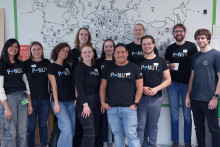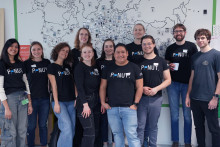The event took place on the 15th of October 2015 and included lectures and practical workshops. Several speakers took the stage to share their knowledge and experience regarding different career opportunities for PhD graduates. One of them was Theo Driessen, who acquired his PhD title at the University of Twente quite recently and has already started a promising career in ASML, a large international company focused on developing microelectronics.
Research vs. industry
'ASML deals with lithography, a critical step in production of chips. The company invests a lot in innovation and has 14,000 employees, out of which about 600 are PhD´s. However, there are only 100 PhD´s in my department, which shows that many of them work outside of research. You don´t necessarily need to have technical skills to succeed in industry,' said Driessen, whose field of expertise is the behavior of droplets.
What is the main difference between being a PhD researcher and working in an industrial company? 'You are no longer surrounded by your peers,' explained Driessen. 'Most people you work with don´t know what exactly you studied or study, so you need to be able to explain your work in basic terms. Also, many parts of your work can be done by suppliers, so you might end up doing more management than actual research.'
More documentation, more topics
If you think a PhD position already involves too much writing, a job in industry might not be the best fit for you. As Driessen pointed out, researchers within a company constantly need to write documentation to keep everybody informed about the latest developments. 'You need to produce more output. As a PhD I wrote 67 pages in four years. In one and half years in industry, I have already produced 200 pages.'
There are also advantages to working in industry. 'You are solving problems with the support of an involved team and you cover more topics. I also like that hours are counted, so if you work a lot, you can take an extra holiday,' said Driessen.
Final advice
'It´s important to think about what you want to do after your PhD,' the successful graduate offered some final advice. 'I recommend to get professional help with your CV and contact many recruitment agencies - going there will help you improve your interviewing skills. Figure out where you want to be and grow your network.'








